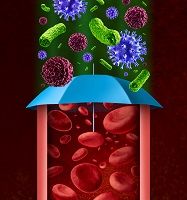Article
Scientists Identify Molecular Switch to ‘Turn Off' Common Virus
Author(s):
While the human cytomegalovirus (HCMV) may be a common virus that is usually fought off by a healthy immune system, it can cause life-threatening infections.

While the human cytomegalovirus (HCMV) may be a common virus that is usually fought off by a healthy immune system, it can cause life-threatening infections.
Even in industrialized nations, about 60% of the population is infected by HCMV and the percentage almost reaches entirety in less developed countries.Researchers from the School of Life Sciences at École Polytechnique Fédérale de Lausanne (EPFL) in Switzerland discovered the protein that either reactivates the infection or leaves it dormant.
”This virus persists for life by hiding in blood-making ("hematopoietic") stem cells, where it lies dormant and goes completely unrecognized,” a news release explained the process.“It occasionally reactivates in the descendants of these hematopoietic stem cells, but these bouts are rapidly tamed by the immune system.”
The statement notes that most people are introduced to the virus during childhood, but not everyone’s body can fight it off. Individuals who take immunosuppressive drugs, because of AIDS, organ transplant, or other circumstances, are at an increased risk at experiencing the wrath of HCMV.
The scientists pinpointed the protein that is attached to the HCMV genome in latently infected hematopoietic stem cells, which was documented in eLife. This finding allowed the authors to modify the virus activation.
“The switch can be manipulated with simple drugs to force the virus out of dormancy, making it easy to target with antivirals,” the release explained.
Using chloroquine, a drug usually used to fight malaria, the team was successfully able to control the molecular switch. By reactivating the virus it gave the researchers the opportunity to eliminate the cells infected with HCMV.
The EPFL scientists are now taking this finding and applying itas a method to get rid of infected tissue in bone marrow. Once the results are in on that test, the first human trials can begin.
Controlling the HCMV switch while providing an antiviral drug could be the key to helping patients before a transplant, the authors concluded.


